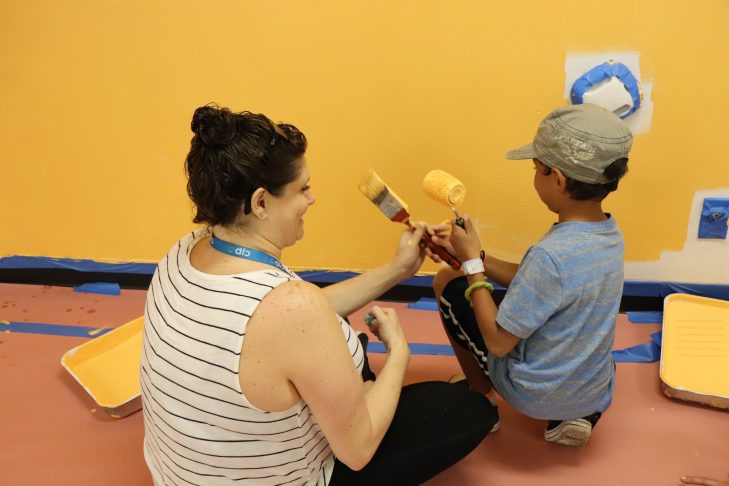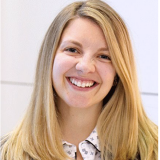“Watch the paint!”
Someone called over to me urgently, just as I was about to step into a large puddle of bright orange paint that had somehow landed on the floor. I was painting a wall with two other women, the wall of the living area for newly arrived immigrants who had just crossed the border in San Diego.
I was there as the director of caring and social justice at Combined Jewish Philanthropies, and as someone who cares deeply about the humanitarian crisis on our border. More than 20 women from CJP’s Women’s Philanthropy group had told me they felt helpless in the face of the constant news coming out about the border. They wanted to learn more about what was happening on the ground—to bear witness and to make a difference.
As we painted, I saw a head peek around the corner: “Puedo ayudar?” (“Can I help?”). We handed him a brush and the four of us got back to work: three grown women from Boston and one 8-year-old boy, A, who had just arrived in San Diego after three years of traveling with his family. I don’t remember what we talked about or how, since we didn’t speak a shared language, but we worked and laughed together all afternoon, painting that wall.
That moment was a poignant one for me, and one that I’ve thought a lot about since returning home in August: How are A and his family? Where are they now? And how A’s question—can I help—summarizes so much of the experience for me.
Immigration is an issue that has deep roots in the Jewish experience. Many of the women I traveled with during this trip expressed frustration at not knowing what to do, or how; they came on this trip because they felt compelled as members of the Jewish community to welcome the stranger, and yet were overwhelmed by the sheer weight and complexity of the problem. Over the three days we spent in San Diego we kept returning to what we could do and how we could bring what we’d experienced back to Boston to have local impact in this national conversation.
It was a natural conversation to have, sitting with my colleagues from JFS Metrowest and JCRC in the shelter that JFS of San Diego created from nothing as a grassroots initiative last October, after learning that immigrants in their city had nowhere to go after being released from detention. They have moved six times to larger shelters to meet the need, working with partners across organizations and fields to provide holistic care in a stunning demonstration of the simple maxim that we can do more if we do it together.
We have incredible organizations in Boston that are working to support vulnerable people and families every day. My work at CJP has an immediate and long-term focus: working to ensure that every person has what they need on a daily basis and changing long-term systems that create inequity and injustice. But CJP is not a direct service provider; my work is fundamentally dependent on partnership to see the change take place. In turn, our partners rely on CJP to be a funder and essential convener among agencies.
In this time of seemingly insurmountable barriers and immense need, it’s important to remember that partnership is more than knitting together separate organizations. It’s the boldness to envision an idea bigger than ourselves, with the confidence that our communities have the complementary skills and strengths that we do not individually. There, in that shelter, with the Jewish community leading the way to provide humanitarian aid to the more than 15,000 people who have come through the shelter’s doors, it was clear that we should all ask A’s question “Can I help?” and that the answer for each of us is not simply yes, but we must.
We tend to think of experiences as the time when something happens, but for this trip it can’t end there. I spent three days in San Diego. If we don’t come home and take action to support the immigrant community right here in our own city, then we’ve missed the point: to go and bear witness, to understand the basic and fundamental needs of families who are coming—many of whom include young children—and to work together as a community to meet those needs in a way that recognizes the inherent dignity of all people.
I’ll treasure the memory of that bright orange wall, and the reminder it offers each time I think of it. We have work to do, and we can do more if we do it together.



